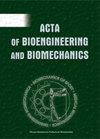髓内钉锁定方法对骨-种植体系统刚度的影响
IF 0.8
4区 医学
Q4 BIOPHYSICS
引用次数: 0
摘要
目的:骨折是兽医创伤学中最常见的问题之一。本研究的作者努力寻找一种新的髓内钉,用于治疗犬股骨骨折患者。本研究的目的是分析髓内钉的生物力学参数,采用一种新的螺栓系统概念。方法:取大犬股骨标本,切开模拟骨折间隙,用带锁紧螺钉的髓内钉固定。骨钉系统在手术后的头几天受到与股骨负荷相对应的力的循环载荷。对种植体周围的骨样本进行微ct扫描,以确定骨组织的变形和结构参数。结果:通过分析实验研究中记录的力位移曲线,计算出骨钉系统刚度。使用单皮质锁紧螺栓比使用双皮质锁紧螺栓产生更小的骨钉系统刚度。结论:本研究结果表明髓内钉可以很好地治疗犬骨折。单皮质螺钉具有良好的稳定性和良好的生物力学环境。所描述的固定方法很容易根据特定患者的个体参数进行调整。本文章由计算机程序翻译,如有差异,请以英文原文为准。
Influence of the intramedullary nail locking method on the stiffness of the bone-implant system
Purpose: Bone fractures are one of the most commonly seen problems in veterinary traumatology. The authors of this study strive to find a new intramedullary nail, which is intended for treating femoral bone fractures for canine patients. The purpose of this study was to analyze biomechanical parameters of the intramedullary nails, which use a new bolt system concept. Methods: Dissected femoral bones of a large breed dog were cut in order to simulate interfragmentary gap, and then the bones were stabilized using intramedullary nail with locking bolts. Bone-nail systems were subjected to cyclic loading using force which corresponds to the load on the femoral bone in the first few days after surgery. Micro-CT scans were taken of the bone samples around implant in order to determine deformation and structural parameters of bone tissue. Results: The calculation of the bone-nail system stiffness was done through analysis of the force displacement curves recorded during experimental studies. Using monocortical locking bolts resulted in smaller stiffness of the bone-nail system than using bicortical locking bolts. Conclusions: The results obtained in this study can indicate that the intramedullary nail could work well when used for treatment of bone fractures in dogs. The authors focused on using monocortical bolts which provides good stability and adequate biomechanical environment. Described fixation method is easily adjustable to a particular patient individual parameters.
求助全文
通过发布文献求助,成功后即可免费获取论文全文。
去求助
来源期刊

Acta of bioengineering and biomechanics
BIOPHYSICS-ENGINEERING, BIOMEDICAL
CiteScore
2.10
自引率
10.00%
发文量
0
期刊介绍:
Acta of Bioengineering and Biomechanics is a platform allowing presentation of investigations results, exchange of ideas and experiences among researchers with technical and medical background.
Papers published in Acta of Bioengineering and Biomechanics may cover a wide range of topics in biomechanics, including, but not limited to:
Tissue Biomechanics,
Orthopedic Biomechanics,
Biomaterials,
Sport Biomechanics.
 求助内容:
求助内容: 应助结果提醒方式:
应助结果提醒方式:


